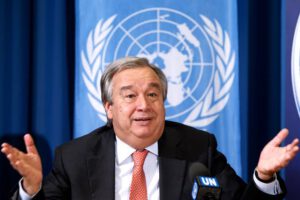The UN Security Council has expressed support for Nigeria’s former President, Olusegun Obasanjo, for his role aimed at brokering peace in the troubled Ethiopia.
In a press statement, released in New York, members of the Council expressed “deep concern” about the expansion and intensification of military clashes in northern Ethiopia.
“Members of the Security Council reiterated their support for the role of regional organizations, namely the African Union (AU) and its High Representative for the Horn of African Region, Olusegun Obasanjo,” the statement read.
The 15-member Security Council noted the impact of the conflict on the humanitarian situation, as well as the stability of the country and the wider region.
They also welcomed the efforts of the UN Secretary-General António Guterres, who had earlier in the week, said: “The stability of Ethiopia and the wider region is at stake.”
Joining Guterres’ appeal, Council Members asked parties to refrain from “inflammatory hate speech and incitement to violence and divisiveness.”
The statement called for the respect of international humanitarian law, for safe and unhindered humanitarian access, the re-establishment of public services, and the scaling up of humanitarian assistance.
The Council Members also called for an end to hostilities and a lasting ceasefire, saying it could be start of “an inclusive Ethiopian national dialogue to resolve the crisis and create the foundation for peace and stability throughout the country.”
The statement also reaffirmed the Security Council’s “strong commitment to the sovereignty, political independence, territorial integrity and unity of Ethiopia.”
After heavy fighting erupted in November 2020 between Government troops and those loyal to the Tigray People’s Liberation Front (TPLF), some 5.2 million people remained in need of assistance across the Ethiopian regions of Tigray, Amhara and Afar.

Amidst allegations of widespread human rights abuses on all sides, thousands were feared killed and more than two million have been forced to flee their homes.
Over the past few months, killings, looting and the destruction of health centres and farms, including irrigation systems that were vital to production, had triggered an even larger surge in humanitarian need, the UN organ said. (NAN)